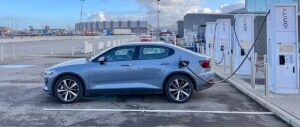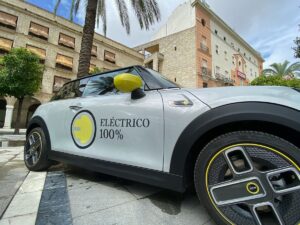
Home / EV Charging News / The Impact of Electric Cars on Employment in the Automotive Industry: Investigating the potential shifts in job roles and skills required as the automotive industry transitions to electric vehicles and related technologies
The automotive industry is experiencing a significant transformation as electric cars become more prevalent. This shift towards electric vehicles (EVs) and related technologies is not only shaping the future of transportation but also has a profound impact on employment within the industry. In this article, we will delve into the implications of electric cars on employment in the automotive industry and explore the potential shifts in job roles and skills that will be required in this evolving landscape.
Electric cars are gaining popularity worldwide due to their environmental benefits, lower operational costs, and technological advancements. As governments and consumers embrace sustainable transportation, the demand for electric vehicles continues to rise. However, this transition to electric cars has far-reaching consequences for the automotive industry, including its workforce.
The automotive industry is undergoing a profound transformation driven by the transition to electric cars. As automakers shift their focus towards sustainable mobility solutions, traditional combustion engine vehicles are gradually being replaced by electric vehicles. This transition has a ripple effect on various aspects of the industry, including employment.
The rise of electric cars has implications for traditional automotive manufacturing jobs. As electric vehicles have simpler powertrain systems compared to internal combustion engines, the production processes may change. While there may be a decline in certain jobs related to combustion engine manufacturing, new opportunities will arise in electric vehicle production lines.
The shift to electric vehicles opens up new job opportunities in the production of EV components and batteries. Roles such as battery assembly technicians, electric motor production specialists, and electrical system engineers will be in high demand. This transition presents a chance for workers to acquire new skills and transition to these emerging roles.
With the increase in electric vehicle adoption, the demand for skilled technicians who can maintain and repair EVs is also growing. Electric vehicle technicians will need specialized training to handle the unique features and systems of electric cars, such as battery diagnostics and high-voltage safety protocols. This demand for electric vehicle technicians offers employment prospects for individuals interested in this field.
The development of advanced battery technologies is crucial for the success of electric cars. This has created a demand for skilled engineers who specialize in battery technology, energy storage systems, and power electronics. Engineers with expertise in these areas will play a vital role in designing and optimizing the performance of electric vehicle batteries, ensuring their efficiency and reliability.
The transition to electric cars requires the development of new skillsets to support the evolving technologies. Here are some key areas where individuals can focus on acquiring relevant skills:
To cater to the growing number of electric vehicles on the road, there will be a need for technicians with expertise in electric vehicle maintenance and repair. Familiarity with electric powertrains, battery systems, and diagnostics will be essential in providing efficient service to electric car owners.
Battery technology is at the heart of electric cars, and understanding its intricacies is crucial for those seeking employment in this field. Knowledge of battery chemistry, energy storage systems, and charging infrastructure will be in high demand as the electric vehicle market expands.
As electric vehicles become more connected and autonomous, software and data analytics skills will play a crucial role. Professionals well-versed in vehicle telematics, software development, and data analysis will contribute to the design and development of innovative electric vehicle features.
To ensure a smooth transition to electric cars and support the changing employment landscape, various measures can be taken to adapt the workforce:
Collaborations between automotive industry stakeholders and educational institutions are vital to equip the workforce with the necessary skills. These partnerships can facilitate the development of specialized training programs and apprenticeships tailored to electric vehicle technologies.
To assist workers impacted by the shift in job roles, upskilling and reskilling programs can be implemented. These programs provide opportunities for employees to acquire new skills and transition to emerging roles within the electric vehicle sector.
Preparing the future workforce for the electric vehicle industry starts with emphasizing STEM (Science, Technology, Engineering, and Mathematics) education. Encouraging students to pursue relevant disciplines will cultivate a pool of talent well-prepared for the evolving automotive industry.
Government policies and incentives play a crucial role in facilitating the transition to electric cars and supporting employment in the automotive industry. Some key policy measures include:
Governments can incentivize electric vehicle adoption through tax incentives, subsidies, and grants. These measures encourage consumers to choose electric cars, thereby driving demand and supporting employment in the electric vehicle industry.
To address the range anxiety associated with electric vehicles, governments can invest in charging infrastructure. Establishing a robust network of charging stations enables the widespread adoption of electric cars, further stimulating employment opportunities in EV-related sectors.
Government policies can support the workforce transition by offering financial assistance, training subsidies, and job placement programs. These initiatives help individuals affected by job shifts to reskill and find employment in the evolving automotive industry.
The impact of electric cars on employment in the automotive industry is profound. As the industry transitions to electric vehicles and related technologies, job roles are shifting, and new skills are in demand. The rise of electric cars presents both challenges and opportunities for the workforce, necessitating the acquisition of specialized skills in areas such as electric vehicle production, maintenance, battery technology, and software development. Collaborations between industry and educational institutions, upskilling programs, and government support are crucial in facilitating a successful transition and ensuring a skilled workforce for the future.
$2,890.00 Original price was: $2,890.00.$2,690.00Current price is: $2,690.00.
$4,150.00 Original price was: $4,150.00.$3,790.00Current price is: $3,790.00.
$1,650.00 Original price was: $1,650.00.$1,490.00Current price is: $1,490.00.
$2,290.00 Original price was: $2,290.00.$2,150.00Current price is: $2,150.00.
$1,290.00 Original price was: $1,290.00.$799.00Current price is: $799.00.
$10,690.00 – $11,390.00




Your Power Management Partner for Over 25 Years Future Generations Depend on Our Decisions Today ™
2024 © All rights reserved by CyberSwitching